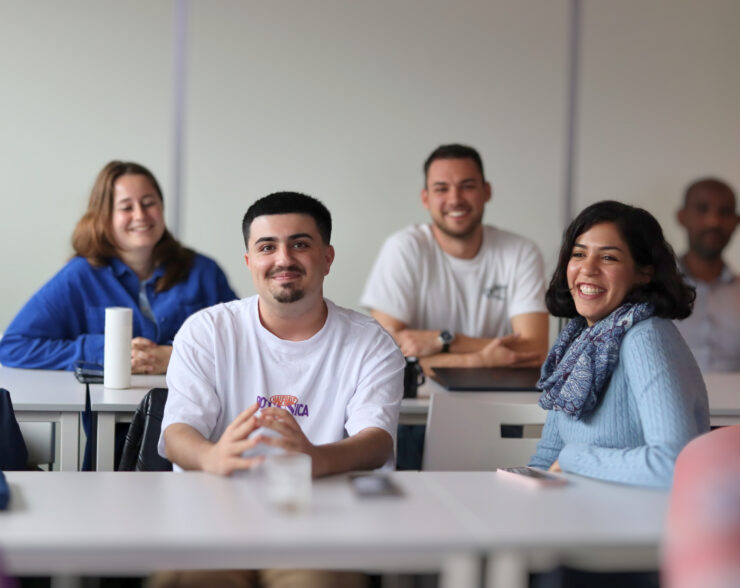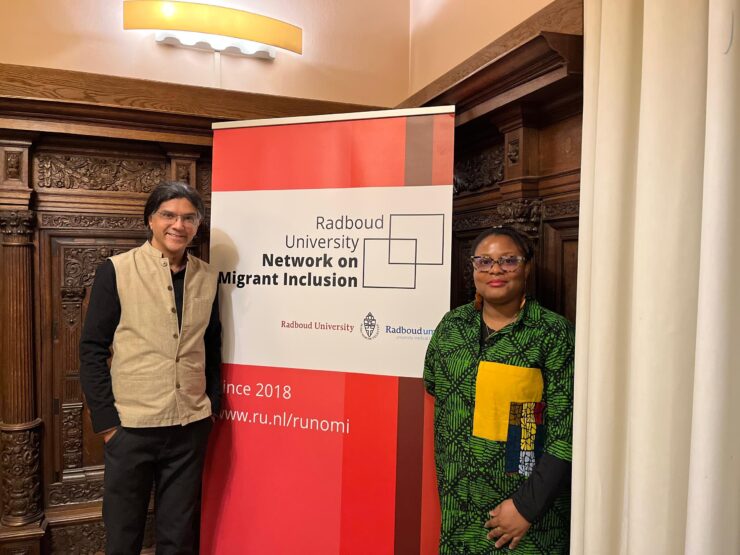
Migrants are people who, for various reasons, decide to seek a new home in another country. In some major Dutch cities, more than half of the population has a migration background, meaning that they themselves or one of their parents were born abroad. Research shows that this group of newcomers is vulnerable: many struggle to find their way in the Netherlands and participate in society as valued members, which is a loss for the newcomer themselves, but also for the Netherlands.
We discussed the challenge of migrant inclusion and the theme ‘Settled, but not at home’ – after a report by the The Netherlands Institute for Social Research – in an interview with dr. Pascal Beckers, coordinator of the Radboud University Network on Migrant Inclusion (RUNOMI).
The challenge: migrant inclusion
Those who move to another country face a host of social, economic and legal challenges. How do you find housing, a job and new friends? How do you stay healthy? How do you become a valued member of society?
Dr. Pascal Beckers immediately shows his engagement at the beginning of the interview. He emphasises that the infrastructure for newcomers in the Netherlands is substandard. Migrant workers receive too little help in learning the language. In addition, refugees sometimes lack the digital skills necessary for success. Super-diversity is a big challenge for municipalities and they will have to respond to it professionally. Beckers: “…one of the biggest political problems in the Netherlands is that there is too little investment in thinking about how to deal with the rapidly increasing diversity.”
Although migration is sometimes seen as a threat to employment, research shows that migrant workers are more likely to strengthen the economy. They fill shortages in crucial sectors and contribute to economic growth. At the same time, good policies are essential: without investment in language, education and integration, both migrants and society as a whole are left behind.
Us-versus-them
Humans are group animals. When a large group of people speak a different language, we quickly place them in the homogeneous group ‘the other’. From that ‘other’, we expect them to work and contribute to the Netherlands. However, migrant workers from European member states receive too little help with their integration, while we depend on their social and economic contribution. Beckers: “… populism takes flight because labour migration is not well managed.” RUNOMI tries to add accurate information to the current public debate.

RUNOMI’s contribution
RUNOMI is a bottom-up interfaculty network of more than 130 scientists working at Radboud University Nijmegen, who believe in the great social contribution of interdisciplinary cooperation in the field of migrant inclusion. Its members collaborate with internal and external partners in research, teaching and social impact activities.
RUNOMI is also involved in several Horizon Europe projects, including GS4S. These projects have an international character and a high policy impact.
The researchers draw on the expertise of all seven faculties of Radboud University – including the faculties of Arts, Management, Law and Social Sciences – to promote innovative approaches. One of the main goals is to put the issues on the agenda. In addition, the researchers also make an impact in a very practical way.
Digital skills training
Applying for a job is now largely a digital process. Research shows that many refugees, especially older and female refugees, still lack the skills to successfully navigate the job application process. RUNOMI researchers organised a seminar series on digital inclusion among migrants to draw attention to this problem, among others. They increased their impact by offering digital skills training to refugees. Thanks in part to SSH-sectorplans and with the help of Arabic-speaking student assistants, they were able to offer these trainings.

How sectorplans accelerate RUNOMI’s impact
The SSH-sectorplans are joint plans for higher education and science specifically for the social sciences and humanities domain. Thanks to the SSH-wide sectorplan, whose main theme is digitisation, RUNOMI was able to hire people to further professionalise and expand the network. These professionals devote 20 per cent of their time to RUNOMI impact and education. Together with dr. Muller-Dugic, for example, Beckers developed a positive psychology course to promote the mental health and labour market participation of Arabic-speaking status holders. SSH-research is ideally suited to contribute to this social, governance and societal challenge of migrant inclusion.
Conclusion
How do we harness the power of super-diversity? RUNOMI’s strong network infrastructure, bringing together science, policy and practice, contributes to sustainable solutions. When we work to ensure that migrants can participate fully, we all benefit. This is how we ensure that diversity does not divide, but strengthens.
We thank dr. Pascal Beckers for sharing his views and explaining the work of RUNOMI.
